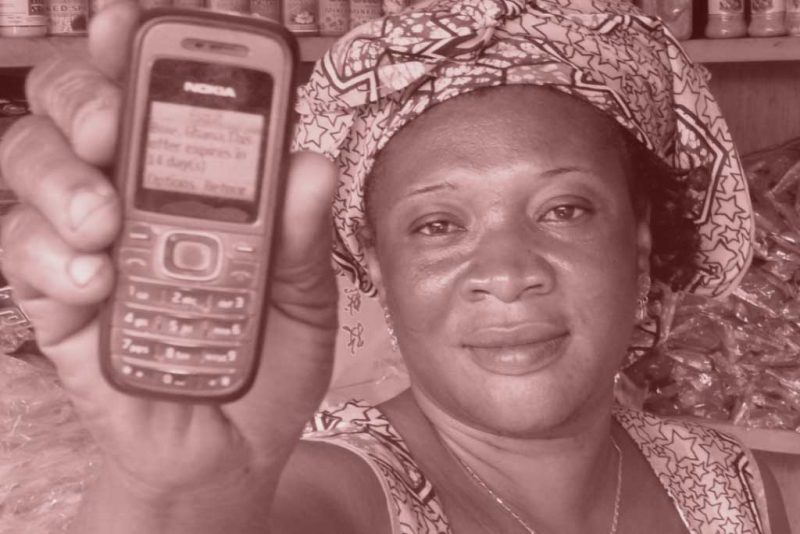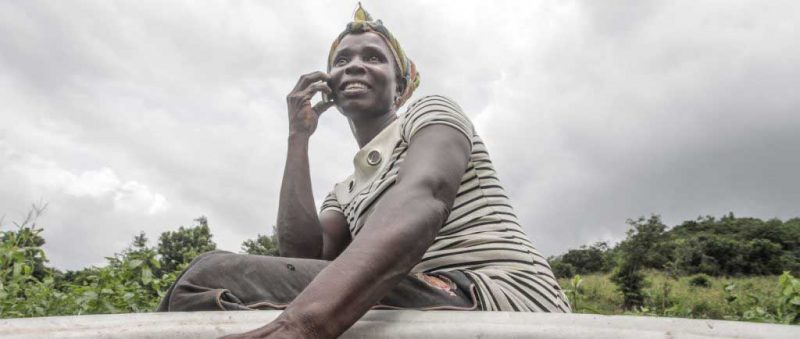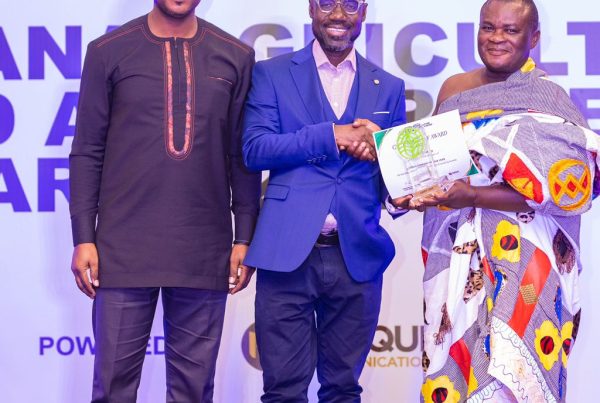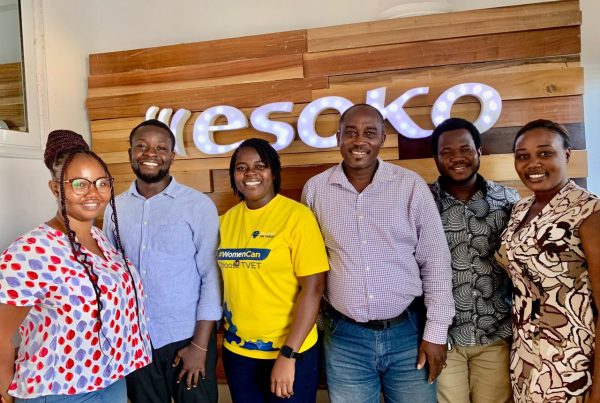
Let’s set the scene. It’s 2008. The African continent is buzzing with a growing number of people newly becoming mobile phone owners. People who had never imagined owning portable telephones, were now in possession of this powerful tool – a mobile device that opened a whole new world of communication. This included people who lived in last mile communities that are often underserved in terms of information, goods and services. Unforeseen opportunities were now at the fingertips of any average joes.
In comes Esoko founder, Mark Davies, on a quest to contribute to Africa’s struggle for development. With a passion for agriculture, he embarks on a mission to improve incomes of smallholder farmers through better access to information. He does this with the help of the mobile phone and his company, Esoko.
How exactly was he going to achieve this and what was the desired outcome? At the time, smallholders across Africa often sold their produce for very cheap to middlemen. These middlemen would go to major markets and make a killing from the produce. This was an unfair practice shackling farmers economically and socially, while enriching middlemen exponentially. Smallholder farmers were and still are among the continent’s poorest communities and it’s largest demographic.
Esoko started by collecting food price data across local market places and disseminating to smallholder farmers through SMS. This way, when middle-men came to buy, farmers could negotiate for better prices with the knowledge of how much their produce was being sold in nearby markets. Over time the company added more agricultural services including West Africa’s first agriculture call centre, weather information and climate-smart agronomic advice.
Studies found that smallholder farmers in Ghana reported a 10% increase in productivity and incomes after receiving Esoko messages for a year.
Everything seems to be going right so far. So, what is it that we missed?
First a couple of statistics about literacy in Africa:
- Literacy rates in Africa are amongst the lowest in the world. According to African library Project, more than 1 in 3 adults cannot read. This ratio is even higher in rural areas.
- Although improving among youth, digital literacy among adults is still low on the continent. We have often found that most smallholders own analogue phones (vs. smart phones) and use their devices more for receiving/making calls than reading/sending SMS messages.
Our earlier solutions centered around SMS-based services (SMS alerts, SMS polls, SMS Weather), and although significant impact was made, we suspect we may have missed an opportunity to make an even greater impact over our 12 years of existence.
Given the literacy challenges on the continent, we believe a strategy centered around voice-based digital solutions would have generated more impact by improving the effectiveness and reach of advisory campaigns across agriculture and other sectors.
Don’t’ get us wrong, for a long time we’ve been aware of the importance of voice-based solutions for service delivery in last mile communities. The impetus for setting up the Esoko call centre in 2013, was to disseminate information and provide support in local languages to communities with low literacy rates. However, at scale, running a call centre could become expensive for some project budgets.
Upgrading from SMS- to voice-based solutions for service delivery to last mile communities

Fast forward to present day, Esoko has incrementally pivoted from SMS based services to voice-based solutions for data collection and information dissemination, namely:
- Interactive Voice Response – which allows you to call people at scale via automated phone calls and playback prerecorded questions and prompts. Recipients reply to the questions or prompts by pressing keys on their phone or speaking into their phones. (two-way)
- Voice SMS – allows you to call people and play back a prerecorded messages in any language (one-way). Project managers can schedule alerts and reminders, in a variety of local languages, to increase awareness and disseminate knowledge on critical issues such as COVID-19, digital financial literacy, latest crop protocols, early-warning systems.
- Call Assisted Telephone interviews – Interviews are carried out by Esoko’s trained call centre agents, guided by a digitized survey or questionnaire. Responses are recorded, tracked and submitted to organizations in real-time through our web reporting dashboard.
For all the above services, Esoko provides easy reporting dashboards for project managers to track progress of their operations and activities in real time.
From agric to health: Use cases for voice-based services
From gathering health data in hard-to-reach communities to training farmers on digital literacy, our voice-based solutions have helped NGO’s, development agencies and research organizations target and deliver a range of services to last mile communities.
IVR services
- Delivering health services to hard-to-reach communities
The MOBCHILD project based at the School of Public Health – KNUST leveraged IVR technology to help improve health information systems and outcomes for children under five years old. Esoko delivered IVR services to 1,000 caregivers in twi and english to reach out to sick children who were to be provided with health information after answering several sequential questions by dialing a tollfree number. Caregivers were linked directly to a health provider for further assistance, depending on the severity of the child’s condition.
- Monitoring diseases through community health volunteers
KCCR is using IVR to monitor cases of Lymphatic Filariasis in rural areas. Community health volunteers simply call the toll free line and answer a list of sequential questions to report patient information including patient ID, gender, severity of disease etc. The IVR is deployed in both English and Fante – with real-time reporting to the KCCR team.
CATI
- Tracking the effects of COVID-19 on income and access to essential goods
At the peak of the pandemic, World Bank consulted Esoko to conduct a weekly survey to understand the impact of lockdowns on their project beneficiaries in Ghana. Esoko deployed computer-assisted telephone interviewing (CATI) to help the WB project office assess the effects of lockdowns and provide the necessary support to their beneficiaries in a timely manner. The survey was conducted in 5 local languages.
Voice SMS
- Improving profitability of smallholders through trainings on Digital Financial Literacy
Esoko provided MEDA with an integrated solution to profile 65,000 farmers using Insyt and deliver training on financial literacy and women’s rights via voice SMS. The Digital Financial Literacy curriculum was converted into short, dramatized voice messages that were serialized and sent to smallholders in their preferred local language. On schedule, automated bi-weekly calls are made to smallholders who are played the message once they answer the call.
Key benefits of voice-based services vs. SMS
Through our interactions with and feedback from partners we’ve made some important learnings developing and delivering voice-based services over these last years. These include:
- Response rates are higher for voice calls vs SMS. After sending millions of text message and automated phone calls via our customers’ campaigns, we’ve seen some key trends: in general the response rate to voice SMS is much higher than to SMS.
- Voice services cost less per interaction than SMS. The cost per response is typically lower for voice because of the higher response rate. While the cost per SMS is often cheaper than for Voice Call minutes, it takes several SMS’s to pack the same content as one Voice minute, so this is misleading. In addition, with IVR/voice you only pay for answered calls, while with SMS you pay regardless of whether the SMS is read by the recipient.
- Improves reach by eliminating the effect of low literacy rates. Voice based solutions enable projects to gather and disseminate information in any local language eliminating the barrier of illiteracy. All users need to do is receive a call and interact with automated voice messages in their preferred language.
- More data generated with voice calls. With automated calls you know exactly who listens, and for how long, what keys they pressed, and why. You can also segment the calls to include only the ones who listened to the whole message, versus those who dropped off in the middle of it. But with SMS campaigns you don’t have that option – you don’t know who actually read the message. Whether it was delivered doesn’t mean that it was read, and that makes it harder to interpret the results.
Get in touch to discuss your project and how you can leverage voice-based solutions for successful project outcomes. Send us an email via info@esoko.com or visit www.esoko.com to learn more.


